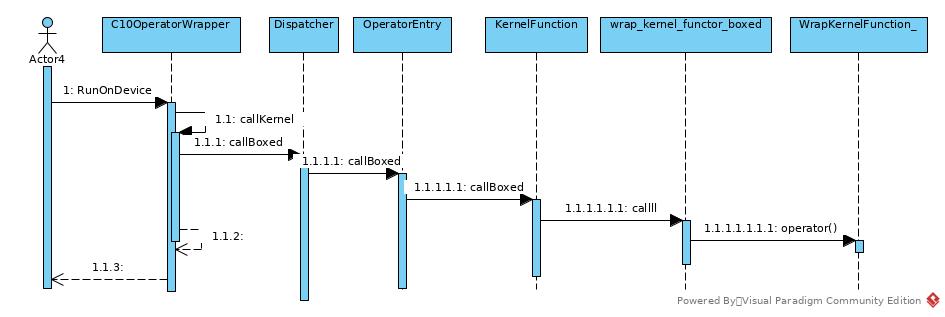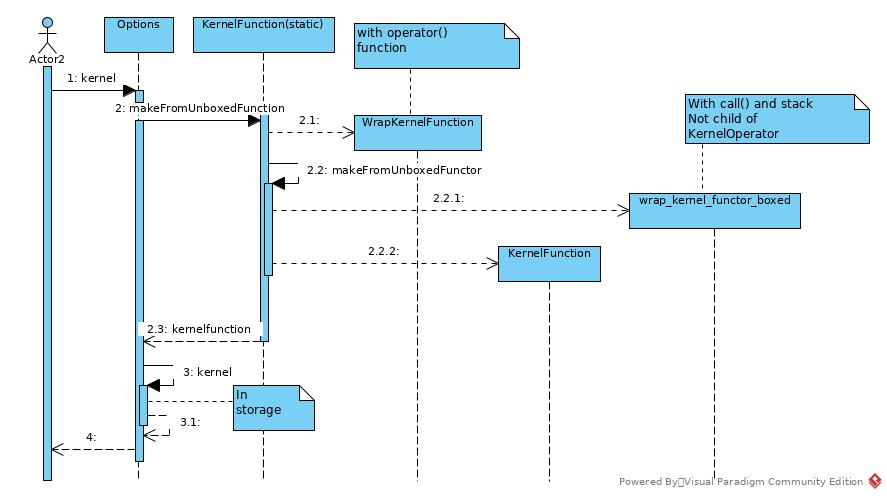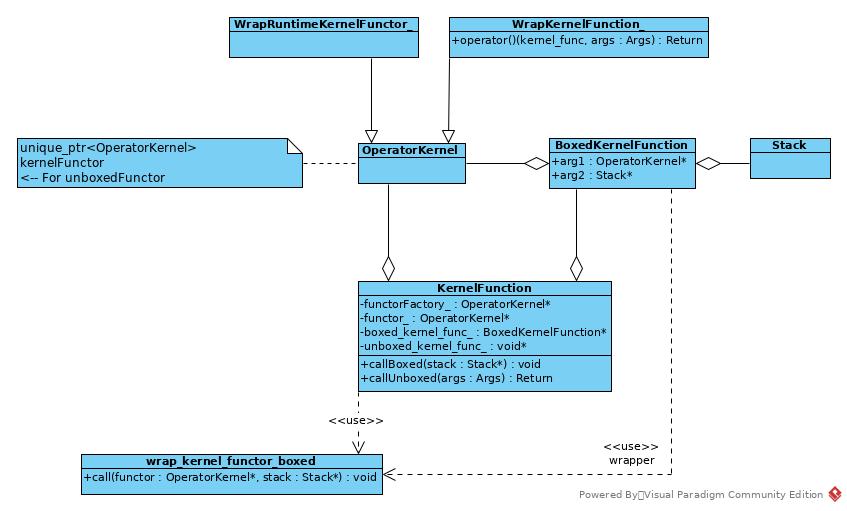Kernel Registration
Three Types of Processors
Pytorch is able to wrap all three types of processor (operators) into a uniform format: KernelFunction. The types could be wrapped are function, functor and lambda.
Sequences
According to following operator invocation sequence image, the uniform format of processors is KernelFunction.

The processor registration sequence is like:

Classes in Pytorch
The relationship of processor wrappers:

Register Difference Kernels by Meta
Entries
The entry of processor wrapping is implemented in op_registration.h. Most processors are registered statically in system initiation. And the registration entries for different processor types recognizes types by meta programming in compile time.
entry0
private:
Options&& kernel(c10::optional<TensorTypeId>&& dispatch_key, KernelFunction&& func,
std::unique_ptr<FunctionSchema>&& inferred_function_schema) && {
KernelRegistrationConfig config;
config.dispatch_key = dispatch_key;
config.func = std::move(func);
config.inferred_function_schema = std::move(inferred_function_schema);
kernels.push_back(std::move(config));
return std::move(*this);
}
- This is the private function that each other kernel function would end up with.
- This function put the processor into registry storage
entry1
// internal-only for registering stack based kernels Options&& kernel(TensorTypeId dispatch_key, KernelFunction::BoxedKernelFunction* kernel_func) && { - This is internal-only function, not for users of pytorch
entry2
template<class KernelFunctor, class... ConstructorParameters> guts::enable_if_t<guts::is_functor<KernelFunctor>::value, Options&&> kernel(TensorTypeId dispatch_key, ConstructorParameters&&... constructorParameters) && { static_assert(std::is_base_of<OperatorKernel, KernelFunctor>::value, "Tried to register a kernel functor using the kernel<Functor>() API, but it doesn't inherit from c10::OperatorKernel. Please have the functor inherit from it."); static_assert(std::is_constructible<KernelFunctor, ConstructorParameters...>::value, "Wrong argument list for constructor of kernel functor. The arguments to kernel<Functor>(arguments...) must match one of the constructors of Functor."); ... } - This entry is for functor.
- The SFINAE mechanism works in ReturnType by guts::enable_if_t. Then there are static_assert to enforce the KernelFunctor is derived from OperatorKernel and the functor is constructable from Parameter so that we can create KernelFactory object from these Parameter(types)
- As the KernelFunctor is already a child of OperatorKernel, the class figure above shows that there is no wrapper for this type of kernel.
- The ConstrucotrPatameters is not mandatory
entry3
template<class FuncType, FuncType* kernel_func>
guts::enable_if_t<guts::is_function_type<FuncType>::value, Options&&> kernel(TensorTypeId dispatch_key) && {
static_assert(!std::is_same<FuncType, KernelFunction::BoxedKernelFunction>::value,
"Tried to register a stackbased (i.e. internal) kernel function using the public kernel<...>() API. Please either use the internal kernel(...) API or also implement the kernel function as defined by the public API.");
static_assert(kernel_func != nullptr, "Kernel function cannot be nullptr");
...
}
- This entry is for efficient function wrapping
- As declared in annotation, as the type parameters (FuncType and kernel_func) for internal kernel function are ready, this function may be able to be compiled as inline
- The static_assert forbids FuncType as BoxedKernelFunction, as it is more efficient to wrap it with the first kernel function
- If BoxedKernelFunction was allowed, the input parameter Stack of this kernel must include the OperatorKernel itself. I don’t know if it is OK in runtime, while it is confusing for users to make up the Stack object.
entry4
template<class FuncType>
// enable_if: only enable it if FuncType is actually a function
guts::enable_if_t<guts::is_function_type<FuncType>::value, Options&&> kernel(TensorTypeId dispatch_key, FuncType* kernel_func) && {
static_assert(!std::is_same<FuncType, KernelFunction::BoxedKernelFunction>::value, "Tried to register a stackbased (i.e. internal) kernel function using the public kernel<...>() API. Please either use the internal kernel(...) API or also implement the kernel function as defined by the public API.");
TORCH_INTERNAL_ASSERT(kernel_func != nullptr, "Kernel function cannot be nullptr");
...
}
- This is less efficient function for function type wrapping as the template only specializes codes for types(FuncType), but not for function object/reference.
entry5
template<class Lambda>
guts::enable_if_t<
guts::is_functor<guts::decay_t<Lambda>>::value
&& !std::is_same<typename guts::infer_function_traits_t<guts::decay_t<Lambda>>::func_type,
KernelFunction::BoxedKernelFunction>::value,
Options&&> kernel(TensorTypeId dispatch_key, Lambda&& functor) && {
static_assert(!std::is_base_of<OperatorKernel, guts::decay_t<Lambda>>::value, "The kernel(x) API for registering a kernel is only meant to be used with lambdas. Your kernel is a functor. Please use the kernel<Functor>() API instead.");
// We don't support stateful lambdas (i.e. lambdas with a capture), because their
// behavior would be nonobvious. A functor kernel with cache gets a new instance of
// its cache each time the kernel is looked up from the dispatch table.
// A lambda with a capture would be global and share its capture between all kernel lookups.
// So, instead of making users having to think about it (including the thread-safety
// issues this causes), let's just forbid stateful lambdas alltogether.
static_assert(guts::is_stateless_lambda<guts::decay_t<Lambda>>::value, "The kernel(x) API for registering a kernel only works for stateless lambdas (i.e. lambdas without captures). If you need a cache, please use the functor based API kernel<Functor>() instead.");
...
}
- This entry is for lambda wrapping.
- *guts::is_functor<guts::decay_t
>::value* to check if the lambda is valid - No stateful lambda allowed
Wrapping Process
BoxedKernelFunction
static KernelFunction makeFromBoxedFunction(BoxedKernelFunction* func) {
std::cout << "KernelFunction::makeFromBoxedFunction" << std::endl;
return KernelFunction(
nullptr, // no functorFactory_, this can only be called in a boxed way.
nullptr, // no functor_ object either
func,
nullptr // no unboxed function pointer
);
}
The KernelFunction wrapped provides only boxed_kernel_func only as both functor and stack pointers have been provided by func.
functor
template<class KernelFunctor, class... ConstructorParameters>
// enable_if: only enable it if KernelFunctor is actually a functor
guts::enable_if_t<guts::is_functor<KernelFunctor>::value, Options&&> kernel(TensorTypeId dispatch_key,
ConstructorParameters&&... constructorParameters) && {
//...
return std::move(*this).kernel(
std::move(dispatch_key),
KernelFunction::makeFromUnboxedFunctorFactory<KernelFunctor>(
detail::KernelFactory<KernelFunctor, guts::decay_t<ConstructorParameters>...>(
std::forward<ConstructorParameters>(constructorParameters)...)),
detail::FunctionSchemaInferer<KernelFunctor>()()
);
}
The entry provided a factory instead of an object as the template was specialized in compile time and the kernel was registered statically. while a functor requires an object.
template<class KernelFunctor, class... Args>
class KernelFactory final {
static_assert(std::is_constructible<KernelFunctor, Args...>::value, "Wrong argument types for constructor of kernel functor.");
public:
explicit constexpr KernelFactory(Args... args)
: constructor_parameters_(std::move(args)...) {
// std::cout << "KernelFactory::constructor" << std::endl;
}
std::unique_ptr<OperatorKernel> operator()() const {
std::cout << "KernelFactory::operator()" << std::endl;
return guts::apply(
[] (const Args&... params) -> std::unique_ptr<OperatorKernel> {return guts::make_unique_base<OperatorKernel, KernelFunctor>(params...); },
constructor_parameters_);
}
private:
std::tuple<Args...> constructor_parameters_;
};
The KernelFactory creates functor of type KernelFunctor that inherits OperatorKernel
template<class KernelFunctor, bool AllowLegacyTypes = false>
static KernelFunction makeFromUnboxedFunctorFactory(std::function<std::unique_ptr<OperatorKernel>()> kernelFunctorFactory) {
static_assert(guts::is_functor<KernelFunctor>::value, "Tried to call KernelFunction::makeFromUnboxedFunctor<KernelFunctor> but the argument is not a functor.");
static_assert(std::is_base_of<OperatorKernel, KernelFunctor>::value, "Tried to call KernelFunction::makeFromUnboxedFunctor<KernelFunctor>, but the functor doesn't inherit from c10::OperatorKernel. Please have the functor inherit from it.");
std::cout << "KernelFunction::makeFromUnboxedFunctorFactory" << std::endl;
return KernelFunction(
std::move(kernelFunctorFactory),
nullptr, // delay creation of functor_ (it will be created by calling functorFactory_ later)
&detail::wrap_kernel_functor_boxed<KernelFunctor, AllowLegacyTypes>::call,
reinterpret_cast<void*>(&detail::wrap_kernel_functor_unboxed<KernelFunctor>::call)
);
}
The KernelFunction to be wrapped is created by above function. The KernelFunction has functorFactory_ and boxed_kernel_func_ set, as the functor object will be created in run-time with dynamic constructor arguments, while the callBoxed or callUnboxed function requires a
Why the Functor is wrapped by another call() function?
- When the KernelFunction has been stored in registry, it lost its real type. To users, it is just some KernelFunction and OperatorKernel pointers.
- When the call() function invoked, there are just input and return arguments specialized.
As it is natural for user (e.g. NN Model) to set these parameters,
while it is unreasonable for user to provide
template parameters, which will make the extensibility and flexibility of the framework unfeasible. - If we make the facade as, for example, a simple OperatorKernel.operator()(args) and make every child class of OperatorKernel to implements these operator() function, the number of the permutation of input types and the conflicts of return type for same input types make the strategy almost impossible.
- So we wrapped the OperatorKernel again and provided a static function to make the operations in a uniform format without consideration of inheritance tree
- Besides operator input arguments, the call function also receive a functor argument to take advantage of functor/lambda properties. (Not sure if it is best solution)
- For boxed/unboxed functor, the specialized wrap_kernel_functor_(un)boxed struct holds the functor signature as by parameter KernelFunctor, and the OperatorKernel input argument is static_cast-ed into KernelFunctor in static call function.
- The call function also manipulates stack for boxed kernel.
Sequence
- KernelFunctor Type + ConstructorParameter Types
- A KernelFactory for above types
- A wrap_kernel_functor_boxed specialized type for KernelFunctor type, the wrapper class provides static call function
- A wrap_kernel_functor_unboxed specialized type for KernelFunctor Type,
the wrapper provides static call function
Function
template<class FuncType, FuncType* kernel_func> guts::enable_if_t<guts::is_function_type<FuncType>::value, Options&&> kernel(TensorTypeId dispatch_key) && { return std::move(*this).kernel( std::move(dispatch_key), KernelFunction::makeFromUnboxedFunction<FuncType, kernel_func>(), detail::FunctionSchemaInferer<typename detail::WrapKernelFunction<FuncType, kernel_func>::type>()() ); }As mentioned above, the kernel function specialized by both FuncType and kernel_func.
template<class FuncType, FuncType* func, bool AllowLegacyTypes = false>
static KernelFunction makeFromUnboxedFunction() {
return makeFromUnboxedFunctor<AllowLegacyTypes, typename detail::WrapKernelFunction<FuncType, func>::type>(
guts::make_unique_base<OperatorKernel, typename detail::WrapKernelFunction<FuncType, func>::type>()
);
}
The function is wrapped into a WrapKernelFunction_ functor
template<class FuncType, FuncType* kernel_func, class ReturnType, class... Parameters>
class WrapKernelFunction_<FuncType, kernel_func, ReturnType, guts::typelist::typelist<Parameters...>> final
: public c10::OperatorKernel {
public:
auto operator()(Parameters... args) -> decltype((*kernel_func)(std::forward<Parameters>(args)...)) {
std::cout << "WrapKernelFunction_::operator()" << std::endl;
return (*kernel_func)(std::forward<Parameters>(args)...);
}
};
Then generate KernelFunction for this functor instead of function:
template<bool AllowLegacyTypes = false, class KernelFunctor>
static KernelFunction makeFromUnboxedFunctor(std::unique_ptr<OperatorKernel> kernelFunctor) {
return KernelFunction(
nullptr, // no functorFactory_ because we already have the functor_
std::move(kernelFunctor),
&detail::wrap_kernel_functor_boxed<KernelFunctor, AllowLegacyTypes>::call,
reinterpret_cast<void*>(&detail::wrap_kernel_functor_unboxed<KernelFunctor>::call)
);
}
As mentioned above, the functor is wrapped by a static call function
Lambda
template<class Lambda>
// enable_if: only enable it if Lambda is a functor (note: lambdas are functors)
guts::enable_if_t<
guts::is_functor<guts::decay_t<Lambda>>::value
&& !std::is_same<typename guts::infer_function_traits_t<guts::decay_t<Lambda>>::func_type,
KernelFunction::BoxedKernelFunction>::value,
Options&&> kernel(TensorTypeId dispatch_key, Lambda&& functor) && {
return std::move(*this).kernel(
std::move(dispatch_key),
KernelFunction::makeFromUnboxedLambda(std::forward<Lambda>(functor)),
detail::FunctionSchemaInferer<detail::WrapRuntimeKernelFunctor<guts::decay_t<Lambda>>>()()
);
}
KernelFunction is generated by
template<bool AllowLegacyTypes = false, class Lambda>
static KernelFunction makeFromUnboxedLambda(Lambda&& lambda) {
return makeFromUnboxedFunctor<AllowLegacyTypes, detail::WrapRuntimeKernelFunctor<guts::decay_t<Lambda>>>(
guts::make_unique_base<OperatorKernel, detail::WrapRuntimeKernelFunctor<guts::decay_t<Lambda>>>(std::forward<Lambda>(lambda))
);
}
The WrapRuntimeKernelFunctor provides a type to specialize makeFromUnboxedFunctor
template<class FuncType>
using WrapRuntimeKernelFunctor = WrapRuntimeKernelFunctor_<
FuncType,
typename guts::infer_function_traits_t<FuncType>::return_type,
typename guts::infer_function_traits_t<FuncType>::parameter_types
>;
The WrapRuntimeKernelFunctor also recognizes return_type and parameter_type of the lambda and generate a corresponding functor.
template<class FuncType, class ReturnType, class... Parameters>
class WrapRuntimeKernelFunctor_<FuncType, ReturnType, guts::typelist::typelist<Parameters...>> final : public c10::OperatorKernel {
public:
template<class FuncType_>
explicit WrapRuntimeKernelFunctor_(FuncType_&& kernel_func)
: kernel_func_(std::forward<FuncType_>(kernel_func)) {
std::cout << "WrapRuntimeKernelFunctor" << std::endl;
}
auto operator()(Parameters... args) -> decltype(std::declval<FuncType>()(std::forward<Parameters>(args)...)) {
std::cout << "WrapRuntimeKernelFunctor::operator()" << std::endl;
return kernel_func_(std::forward<Parameters>(args)...);
}
private:
FuncType kernel_func_;
};
Then the KernelFunction is created by makeFromUnboxedFunctor
Conclusion
In general, all unboxed types are wrapped into functor and then an assistant class generated to provide static call function to complete the registration and to preserve the type information of types.
Some Meta Programming Practices
The Stack
template<class Functor, bool AllowDeprecatedTypes, size_t... ivalue_arg_indices>
typename guts::infer_function_traits_t<Functor>::return_type call_functor_with_args_from_stack_(Functor* functor, Stack* stack, guts::index_sequence<ivalue_arg_indices...>) {
(void)(stack); // when sizeof...(ivalue_arg_indices) == 0, this argument would be unused and we have to silence the compiler warning.
constexpr size_t num_ivalue_args = sizeof...(ivalue_arg_indices);
using IValueArgTypes = typename guts::infer_function_traits_t<Functor>::parameter_types;
return (*functor)(ivalue_to_arg<
guts::remove_cv_t<
guts::remove_reference_t<
guts::typelist::element_t<ivalue_arg_indices, IValueArgTypes>
>>,
AllowDeprecatedTypes>(
std::move(torch::jit::peek(*stack, ivalue_arg_indices, num_ivalue_args))
)
...);
}
This function shows how to flatten Stack into function input arguments.
- (…ivalue_arg_indices) is a collection of indices, it is (0, …, N) (N = #args) in default. ivalue_arg_indices is a certain index in the collection, the value = the nth value in the collection in nth loop step
- num_ivalue_args = number of args
- …IvalueArgTypes is a collection of arg types
- When functor is executed, all arguments should have been ready
- *ivalue_to_arg<>()… is variable length input format. All arguments would be popped out from stack in this style.
- guts::remove_cv_t<guts::remove_reference_t<» is to get the plain type of the paremeter
- guts::typelist::element_t<ivalue_arg_indices, IValueArgTypes> gets the type of nth parameter
- After above step, the sentence is like
(*functor)(ivalue_to_arg<Type, AllowDeprecatedTypes>( std::move(torch::jit::peek(*stack, ivalue_arg_indices, num_ivalue_args)) ) - torch::jit::peek(stack, ivalue_arg_indices, num_ivalue_args)* means: Suppose stack is a vector, step back from the end of stack in num_ivalue_args steps, and take this position as front of the stack, then get the ivalue_arg_indicesth element of the stack.
- After above step, the sentence is like:
(*functor)(ivalue_to_arg<Type, AllowDeprecatedTypes>(IValue); - ivalue_to_arg converse Ivalue into Type and make it the ivalue_arg_indicesth argument of the functor
- The steps loop for the next input argument